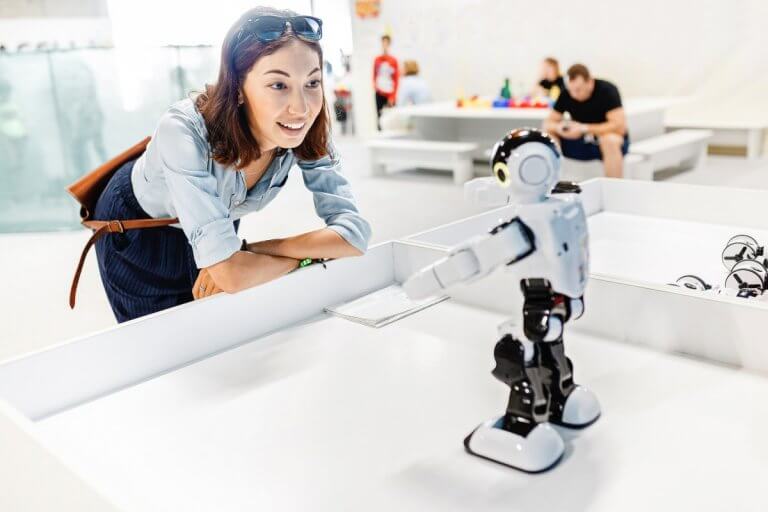
“If we do it right, we might actually be able to evolve a form of work that taps into our uniquely human capabilities and restores our humanity. The ultimate paradox is that this technology may become the powerful catalyst that we need to reclaim our humanity.” – John Hagel
Once a buzz-phrase used largely by futurists and technologists, artificial intelligence (AI) has now entered the mainstream, impacting nearly every sector in ways once deemed inconceivable.
It’s a field that encompasses and influences every form of science; from health to astronomy, to biotechnology and everything in between.
In recent months, AI has even helped us find new and distant planets. In December 2017, NASA and Google announced the discovery of an eighth planet, Kepler-90i, in the Kepler-90 system. This solar system is the first we’ve found to hold the same number of celestial bodies as our own; the revelation was made possible by a new machine learning method developed by Google.
Also described as a “game changer for climate change and the environment”, AI has helped farmers in India achieve 30 percent higher groundnut yields per hectare by providing information on preparing the land, applying fertiliser and selecting the perfect dates for sowing. It has also helped researchers reach 89-99 percent accuracy in identifying tropical cyclones, weather fronts and atmospheric rivers.

Eve. Source: www.pharmaceutical-technology.com. Credit: Ross King, University of Manchester
And while AI has already inspired a wealth of historic medical breakthroughs, perhaps one of its most remarkable comes in the form of an AI-based robot scientist called Eve. Programmed to refine and test hypotheses to explain observations and run experiments by using other robotics in the lab, Eve has assisted scientists in finding that toothpaste ingredient triclosan could be used to fight drug-resistant malaria – a disease that still claims up to half a million lives every year.
But that merely scrapes the surface of the wonder AI technology has empowered.
Known as the ‘AI Awakening’, this field is steadily revolutionising our contemporary way of life. And with developments occurring faster than it’s possible to keep pace, there’s no turning back.
These technologies can now surpass, or at least match human competence, with experts citing a 50 percent chance that machines will outperform humans in all tasks within 45 years. Since most occupations involve 20-30 particular functions, machine learning has eclipsed traditional manpower, and it won’t be long until it’s rolled out across the global workforce.
A PwC study says 38 percent of jobs in the US alone are at high risk of being replaced by AI within the next 15 years.
“But that doesn’t mean there will be no work available for those who lose their jobs,” John Barrows, owner of JBarrow Sales Training, explains. “Technology displaces and creates jobs. So as the role of computers evolves in the workplace, workers have to evolve their roles as well.”
This is the future, and this is the foundation on which institutions like Università Della Svizzera Italiana help graduates succeed.
The Faculty of Informatics at Svizzera – one of the 12 certified public universities in Switzerland and member of swissuniversities – is the recognised heartbeat of understanding in advanced informatics.
Despite its relative youth, it’s acknowledged as one of the nation’s major pillars for teaching and research, ranking third after the two Federal Institutes of Tech found within the country.
And the faculty’s main motivation? To train and inform interdisciplinary experts equipped with abstract thinking and generalisation skills, sound knowledge in the application fields of information technologies, and current project management and teamwork capabilities.
A unique programme framed in the context of superintelligence and AI risks, Svizerra’s Lugano campus offers the Master of Artifical Intelligence –Switzerland’s first of its kind.
Here, students profit from the strong knowledge culture of the faculty, the Swiss AI Lab and IDSIA, Dalle Molle Institute for Artificial Intelligence, a common institute with the university and one of the world’s leading research figures in the field.
A wide range of techniques are delivered, including intelligent robotics, artificial deep neural networks, machine learning, meta-heuristics optimization strategies, data mining, data analytics, simulation and distributed algorithms.
Primary course content is integrated with lab work in which students have the chance to use real robotics, all while practicing with state-of-the-art tools and methodologies. After the first few classes on the basic machine learning module, AI Master students will already have grasped how to train self-learning artificial neural networks to recognise images and handwritings better than any other known method.
“Informatics is everywhere,” Professor Antonio Carzangia, Dean of the Faculty, explains.

Source: Shutterstock
“It impacts and contributes to all aspects of human life in modern societies,” he adds, “and therefore it is a platform for exciting careers, not only in information technology but also in economics, health, aerospace, entertainment, and so many other sectors.
“Informatics is our passion…The Faculty continues to grow while keeping an enthusiastic, exciting and vibrant environment for students and researchers.”
And with the force of AI development doing nothing but gaining momentum, passion, enthusiasm and comprehensive insight are exactly the traits the global industry needs. That’s why graduates of Svizzera’s Master of Artificial Intelligence will soon become future leaders, innovators and pioneers of the AI field.
Click here for more information on Università Della Svizzera Italiana
Liked this? Then you’ll love…
Studying AI: Embrace the age of smart technology
École Polytechnique: How technology can lead us to a sustainable future







